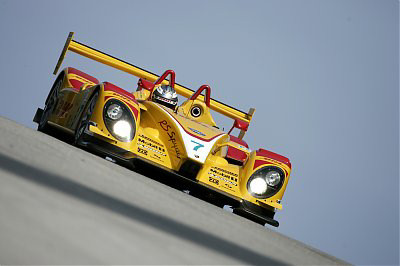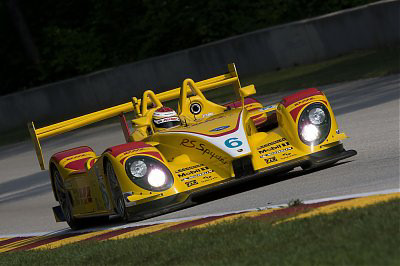The Way It Is/ Can Penske's ALMS Porsche Spyders make it seven in a row at Mosport next weekend?
by Gordon Kirby The most successful by far of Roger Penske's three race teams this year has been his ALMS team. The pair of yellow Penske Porsche RS Spyders have taken this year's American Le Mans Series by storm, repeatedly thrashing the previously all-conquering factory Audi R10 turbo diesels as well as the trio of new factory-backed Acura teams. Timo Bernhard and Romain Dumas scored the Penske/Porsche team's sixth win in a row at Elkhart Lake last weekend and the team is looking to record its seventh successive win at Mosport next weekend on a track which should be much more suited to the LMP2 Porsches than Elkhart Lake.
The most successful by far of Roger Penske's three race teams this year has been his ALMS team. The pair of yellow Penske Porsche RS Spyders have taken this year's American Le Mans Series by storm, repeatedly thrashing the previously all-conquering factory Audi R10 turbo diesels as well as the trio of new factory-backed Acura teams. Timo Bernhard and Romain Dumas scored the Penske/Porsche team's sixth win in a row at Elkhart Lake last weekend and the team is looking to record its seventh successive win at Mosport next weekend on a track which should be much more suited to the LMP2 Porsches than Elkhart Lake.
In this space back in March I took a close look at the winter development program which transformed the RS Spyder from a solid contender in its first year to a pace-setting, regular race winner in its second season. If you want to review that work take a look at the March 12th posting of 'The Way It Is' wherein Penske engineer Nigel Beresford delineated the development program which has brought this year's successes. Much of the improvement comes from an intensive aerodynamic development program orchestrated by Michael Pfadenhauer, a German aerodynamicist who was hired by Porsche from Audi two years ago, but engine performance and fuel efficiency have been equally important.
John Erickson is the general manager of Penske's ALMS team and his comments about last winter's intensive development program reflect those made by Beresford in March about the close liaison between Porsche and Penske engineers. "From the performance side, I think a lot of accolades go to Porsche," Erickson said. "They did a good job with the basic car. Our job is to get the information to Porsche when we see something that can be improved and they've been very good in responding. They did a nice job last winter and we're just fine-tuning the aero package.
"The engine shop at Porsche worked on fuel mileage over the winter and we've used that to our advantage in a few races," Erickson added. "The engine shop worked on making sure that the parts are durable and will live when you run them lean. Utah is probably the race that stands out most where we stretched it as far as you like to. I'm not going to say the cell was dry but there wasn't much left!"
Dieter Steinhauser is Porsche's general manager of motorsport development and leader of the RS Spyder project. Steinhauser says achieving reliability has been the most important element in pushing the program forward.

© LAT USA
"So reliability is very important from the outset. I can remember programs in the past where you lose track time through certain periods of the testing and development program because of reliability issues. But when we go testing with this program we are well sorted-out. We have a defined program--a set-up program, an aero program--and we go through these things step-by-step over two or three tracks days."
The glaring blip in this record of reliability came in the ALMS season-opener at Sebring where both Penske Porsches spent lots of time in the pits fixing alternator problems. "At Sebring, we had the issues with alternators, which was unfortunate," Erickson remarked. "We don't want to lose our focus on '07 but we've got to go back to Sebring in '08 and do it right. This year was very frustrating. But since Sebring we haven't had any reliability issues. We're still working on little things that don't cost you a race, and we're still working on the alternator. We're always trying different pieces during practice or testing. But Sebring aside, knock on wood, reliability has been terrific."
An important factor in many of this year's wins has been smart pit strategy called by Roger Penske and Tim Cindric. "Having good engineers reading the data during the race is essential to making that happen," Erickson remarked. "And don't forget our drivers are all very good, very disciplined and understand how to drive the car to get good fuel mileage.
"Then there's Roger and Tim calling the strategy," Erickson added. "I think a lot of people up and down pit road forget that you've got two guys with tremendous experience. Roger's been running cars for forty years and Tim may be only thirty-six or thirty-seven, but he's been doing this most of his life. He grew up in the sport, working in an engine shop, and he's been running top-level race teams for fifteen years. So that's a lot of good experience to have up in the box on the timing stand."
Steinhauser credits the team for making faster pit stops this year. "We should underline the steps forward the team has brought to us in improving some of the operational systems for pit stops and in bringing their great experience to bear on the race strategy and tactics," Steinhauser said. "The team has made great steps forward in the pit stop processes--the tire-changing and refuelling. The whole season we have had absolutely no mistakes from the mechanics in the pits in the tire changes and refuelling and the driver changes."
Added Erickson: "There are some other good pit crews, but I've got to give a pat on the back to our pit crews. The tire changes have been very quick. The fuelling time was worked on and worked on, and they've done a good job of improving themselves in the pits. There are a couple of other teams out there that are pretty good on their pit stops, but I think our guys are right there with them. It all adds up. If you get good mileage, good stops and spend less time on pit road, it puts you out in front of some of the guys you want to be in front of."

© LAT USA
"Sascha's been around this game a long time," Erickson observed. "He helps us strategize during the race. He'll make a good team manager when he retires from driving. Ryan, of course, is just on it every lap. You don't worry about him. He did an excellent job in Utah. He was in the #6 car at the finish and did a terrific job getting the fuel mileage.
"And Timo and Romain are just on it. They know the game and do the job. We never even question whether any of the drivers are in the game or doing their job. They're on it and it's nice not to have to worry about them."
Added Steinhauser: "It is very important that we have very good and very disciplined drivers who know that the race takes four hours, ten hours or twelve hours, and they understand and can adapt to the changing conditions and work with the team's engineers to adapt the race strategy. It's important for the drivers to be able to drive fast but also to be able to save fuel when required and to be able to think tactically during the races."
After Mosport next weekend, the ALMS runs the following weekend with the IRL on Belle Isle in Detroit before taking a five-week break prior to the Petit Le Mans at Road Atlanta in October. The ALMS closes its season at Laguna Seca two weeks later.
"We've got an Atlanta test prior to the Petit Le Mans," Erickson said. "We won our class there last year. We had some issues, but we got lucky and won the class. So we want to do better all 'round this year."
Erickson said detailed development of the RS Spyder will continue over the winter. "It's an ongoing development program," he remarked. "Porsche is working on a number of different things, some of which we know about, and some we don't. You're always working on the obvious things like aero and power development. From Porsche's point of view, it's still got to be a customer car and reliability is the most important issue."
So the Penske/Porsche marriage has once again proved to be a great success, recalling the combination's halcyon days from 1972 and '73 with the awesome turbo charged 917/10 and 917/30 CanAm cars driven to a pair of championships by George Follmer and Mark Donohue. One of American road racing's most renowned combinations has been reborn over the past two years and has re-written the standards of performance and efficiency in ALMS racing.
It will be interesting therefore to see if the team can maintain its remarkable level of performance over the series' remaining four races. If it does, the Porsche operation will have not only knocked Audi off its ALMS pedestal but also established new standards for Penske's NASCAR and IRL teams to shoot at.
Auto Racing ~ Gordon Kirby
Copyright 2007 ~ All Rights Reserved
Copyright 2007 ~ All Rights Reserved
Top of Page